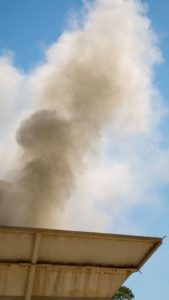Water is an essential part of construction because it plays a role in many different jobs. While a water supply may be available in some areas, in others, it can be unsuitable. There may also be insufficient amounts, or the water that is there is inaccessible to construction crews.
Water hauling services can help construction crews meet the demands of the workplace, becoming a necessary support service to projects of all types, sizes, and locations!
Controlling Dust


By dampening dust, water trucks remove them from the air that construction workers breathe. Depending on the time of year, the job, and the local environmental factors, construction teams may need to keep several inches of soil moist.
Soil Compaction
On many construction sites, workers must compact the soil to create a flat, even surface for buildings, roads, bridges, and other large-scale projects. Heavyweight tools like rollers, rammers and vibratory plates compact the soil by pressing out the air while keeping a proper amount of water content intact.
However, too little water in the soil won’t allow the particles to stick together. Water hauling services can deliver the amount of water needed to keep a fitting water-to-soil ratio, which improves the strength and stability of soil compaction.
Hydrostatic Testing
Hydrostatic testing is necessary when constructing new pipelines. Before the pipes, tanks, and other vessels can enter service, they must be filled with water and attached to a compressor. It’s a test of the integrity of the welds and checks for leaks in the system. Workers can also perform hydrostatic testing on pipelines already in service to confirm the integrity and shipping capacity of the material.
When doing this testing, the team has to use clean water – no sediments can be left behind. Water hauling can deliver this water so that construction crews don’t have to rely on groundwater or local freshwater sources.
Potable Water Sources
According to Canada’s Occupational Health and Safety Regulations: “Every employer shall provide potable water for drinking, personal washing and food preparation that meets the standards set out in the Guidelines for Canadian Drinking Water Quality 1978, published by authority of the Minister of National Health and Welfare.”
In everyday terms, it means there must be a source of water available to every worker, including construction workers. When a site is in a remote spot unconnected to a local water source, water hauling becomes essential for bathrooms, sanitation, drinking, food preparation, and more.
By bringing an alternative and temporary water supply into a construction site, construction managers and team leaders can deliver all the key services on-site and meet the needs of workers.


